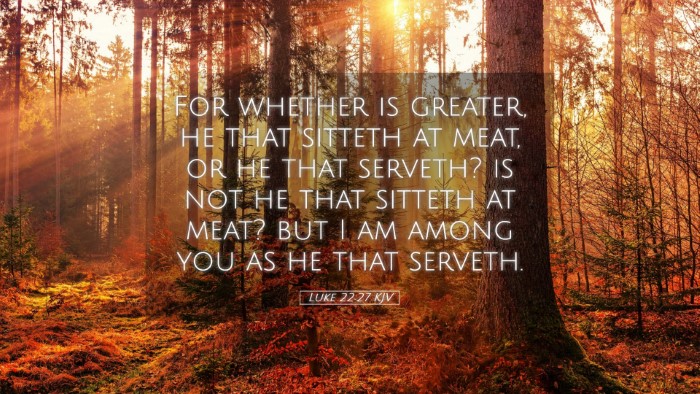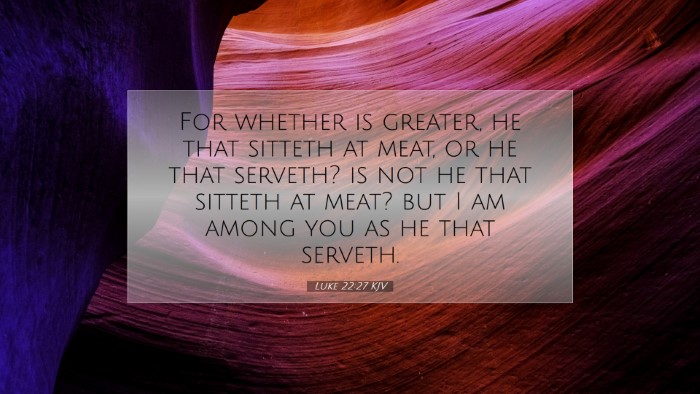Bible Commentary on Luke 22:27
Verse (Luke 22:27, KJV): "For whether is greater, he that sitteth at meat, or he that serveth? is not he that sitteth at meat? but I am among you as he that serveth."
Introduction
This verse comes from a pivotal moment during the Last Supper, as Jesus prepares to face His impending crucifixion. It highlights a profound lesson on humility and servitude within the Christian faith. By analyzing this verse through the lenses of established public domain commentaries, we can extract significant insights that are relevant to pastors, students, theologians, and scholars alike.
Commentary Overview
- Matthew Henry: Henry emphasizes the contrast between worldly notions of greatness and the teachings of Christ. He interprets Jesus' statement as a radical call to humility and selfless service, reminding believers that true greatness in God’s kingdom is measured by one’s willingness to serve others.
- Albert Barnes: Barnes offers a detailed analysis of the cultural context of the time, illustrating how the position of honor was traditionally associated with being served at the table. He draws attention to how Jesus subverts this notion, asserting that despite His divinity and rightful place of honor, He has chosen to serve, providing an example for His followers.
- Adam Clarke: Clarke provides further theological reflections on servanthood, emphasizing the practical outworking of Jesus’ example. He notes that believers are called to be servants in the way they relate to one another, challenging societal norms of dominance and privilege.
Analysis of Key Themes
1. The Nature of True Greatness
At the heart of Luke 22:27 is a profound theological truth about the nature of greatness in the kingdom of God. Matthew Henry articulates that the world often equates greatness with authority, power, and honor. In stark contrast, Jesus proposes that true greatness lies in the act of serving others. This serves as a metaphor for Christ's own ministry on earth, culminating in His sacrificial death.
2. Contrast Between the Servant and the Served
Albert Barnes highlights the cultural implications of Jesus’ words, noting that in contemporary society, the one who dines is seen as superior to the one who serves. Jesus, however, positions Himself as the ultimate servant, turning the expectations of honor upside down. This inversion of roles is emblematic of the values of the Kingdom of God, where the last shall be first, and the first shall be last (Matthew 20:16).
3. The Call to Discipleship
Adam Clarke reflects on the implications of servanthood for those who follow Christ. He asserts that being a disciple means embodying the servitude that Jesus exemplified. This includes a call to humility, a dismissal of pride, and a commitment to serving others in love and compassion.
Theological Implications
The theological significance of Luke 22:27 extends beyond the immediate context of the Last Supper. This passage challenges long-held assumptions about leadership and authority within the church. It suggests that leaders should not seek power for personal gain but rather embrace the role of a servant. In light of this, ecclesiastical structures may need to be reassessed to align with this servant-leadership model.
Practical Applications
- Ministry Leadership: Church leaders are encouraged to adopt a servant-hearted approach to their ministry, fostering a culture of service within their congregations.
- Community Engagement: Christians are called to live out their faith through acts of service within their communities, reflecting Christ's love and humility.
- Personal Reflection: Individuals should regularly evaluate their motivations for service. Are they seeking recognition or genuinely desiring to follow Christ’s example?
Conclusion
Luke 22:27 serves as a timeless reminder of Jesus' radical approach to greatness and service. By combining insights from Matthew Henry, Albert Barnes, and Adam Clarke, we understand that the call to serve is central to Christian discipleship. As we reflect on this passage, may we be inspired to embody Jesus' example in our lives, churches, and communities. The pursuit of greatness in God's eyes is beautifully captured in a simple yet profound act of serving others.


